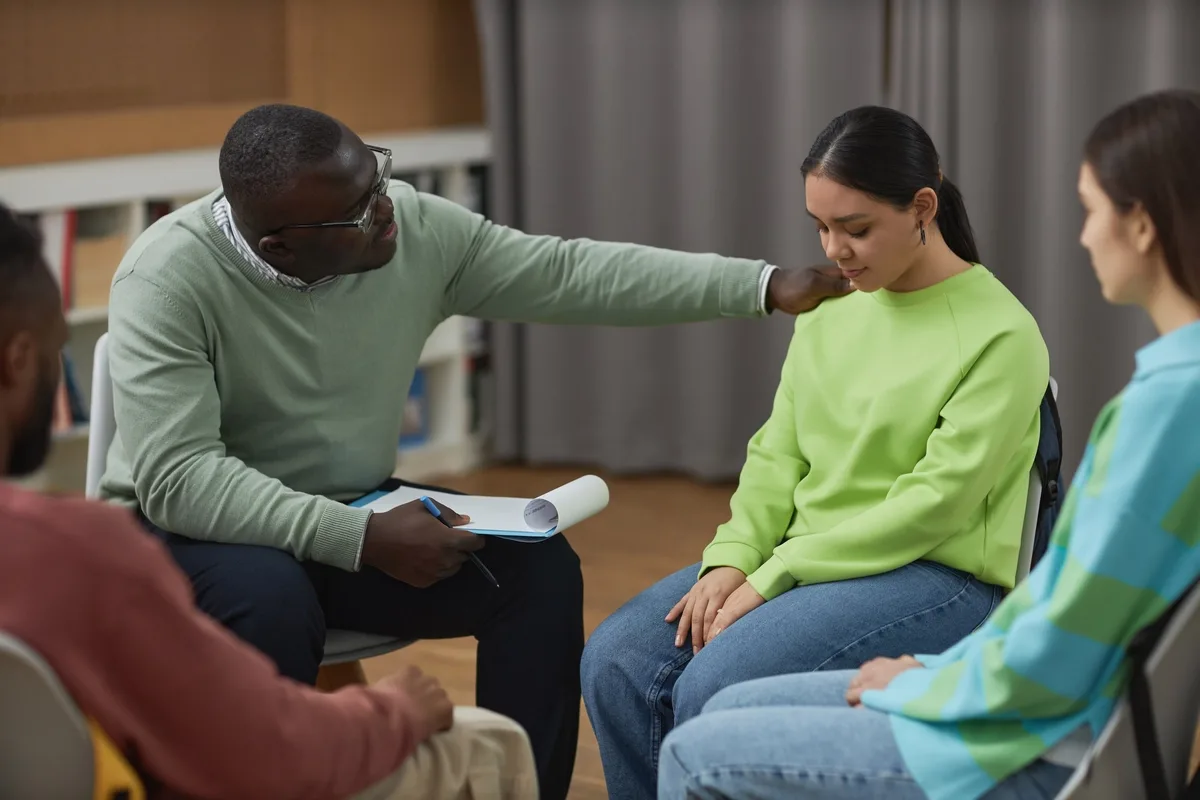24/7 Helpline:
(866) 899-111424/7 Helpline:
(866) 899-1114
Learn more about Depression Treatment centers in Altoona
Depression Treatment in Other Cities

Other Insurance Options

WellCare Health Plans

Highmark

Coventry Health Care

UMR

BHS | Behavioral Health Systems

Amerigroup

Optum

Lucent

American Behavioral

MVP Healthcare

Cigna

Horizon Healthcare Service

ComPsych

Group Health Incorporated

Aetna

United Health Care

Humana

WellPoint

GEHA

Medical Mutual of Ohio





The Recovery Village Drug and Alcohol Rehab
The Recovery Village is a rehab center offering treatment for alcohol and drug addiction, co-occurri...

LifeStream Behavioral Center
LifeStream Behavioral Center meets the behavioral healthcare needs of Lake and Sumter County residen...

NDA Behavioral Health – Deaf Academy
NDA Behavioral Health – Deaf Academy is a private rehab located in Mount Dora, Florida. NDA Behavior...

LifeStream Behavioral Center
LifeStream Behavioral Center meets the behavioral healthcare needs of Lake and Sumter County residen...

LifeStream Behavioral Center – Turning Point Ranch
LifeStream Behavioral Center - Turning Point Ranch is a therapeutic group home for girs with emotion...

Center for Discovery Montverde
Center for Discovery Montverde is a private rehab located in Montverde, Florida. Center for Discover...

Mid Plains Center for Behavioral Health
Mid Plains Center for Behavioral Health is a private rehab located in Grand Island, NE. Mid Plains C...

Friendship House
Friendship House program provides care and support for the recovering alcoholic and drug addict by e...

Friendship House – Outpatient
Friendship House - Outpatient counseling offers services to begin meeting the needs of their increas...









































































Upper Room Counseling Center
Upper Room Counseling Center is a private rehab located in Fruitland Park, Florida. Upper Room Couns...

Family Focus Counseling Center
Family Focus Counseling Center is a private rehab located in Clermont, Florida. Family Focus Counsel...

Reflections of Recovery
Reflections of Recovery is a full service Substance Abuse and Mental Health Integrative Wellness Cen...

Trinity Escape
Trinity Escape is a private rehab located in Clermont, Florida. Trinity Escape specializes in the tr...

Interlock Group of Florida
Interlock Group of Florida is a private rehab located in Mount Dora, Florida. Interlock Group of Flo...

LifeStream Behavioral Center – Services Center
LifeStream Behavioral Center - Services Center provides Forensic Community Services, Family Care Man...

Recovery Solutions
Recovery Solutions offers treatment for mental health and substance abuse issues in a safe and nurtu...

LifeStream Behavioral Center – LAKE Academy
LifeStream Behavioral Center - LAKE Academy provides both academic and therapeutic services to child...

Next Step Village – Eustis
Next Step Village is a private organization located In Eustis, Florida. Next Step Village provides s...

Next Step Village – Umatilla
Next Step Village is located in Umatilla, Florida. Next Step Village is a center offering outpatient...

Center For Discovery Orlando
Center For Discovery Orlando is a private rehab located in Montverde, Florida. Center For Discovery ...

WhiteSands Treatment – Clermont
WhiteSands Treatment – Clermont is a private rehab located in Clermont, Florida. WhiteSands Treatmen...

Sunshine Recovery
Sunshine Recovery is a full-service substance abuse and mental health wellness center offering 24 ho...

Oxford House
Oxford House is a private rehab located in Grand Island, Nebraska. Oxford House specializes in the t...

Saint Francis – Alcoholism and Drug Treatment Center
Saint Francis - Alcoholism and Drug Treatment Center is a private rehab located in Grand Island, NE....

Alano Club
Alano Club is a non-profit rehab located in Grand Island, Nebraska. Alano Club specializes in the tr...

Fellowship House
Fellowship House is a private rehab located in Grand Island, Nebraska. Fellowship House specializes ...

Oxford House – Grand Island
Oxford House – Grand Island is a private rehab located in Grand Island, Nebraska. Oxford House – Gra...

Central Nebraska Council
The Central Nebraska Council on Alcoholism and Addictions is located in Grand Island, Nebraska. The ...



















































































































































































